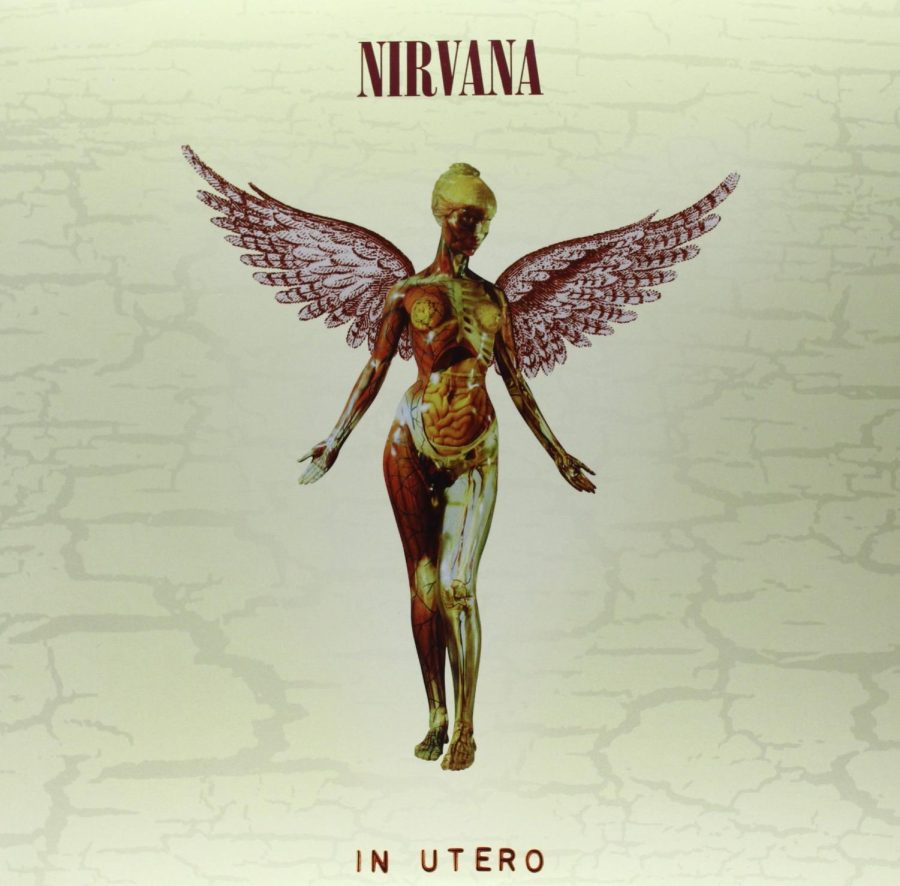Album Review | In Utero by Nirvana
April 10, 2023
The loss of Kurt Cobain, Nirvana’s iconic front man, was a tragedy that toppled the all-encompassing reach of grunge and set alternative music on a path into new territory. With the 29th anniversary of that loss, on Apr. 5, I have been reminded of the wide-reaching influence and cultural shift that Nirvana created with the release of Nevermind. As many know, Nirvana forever changed what could be considered popular music, flipping it on its head in 1991 and opening the gates for the alternative revolution. While maybe not as iconic, Nirvana’s third and final album, In Utero, showed us a more raw and experimental side to the band. Wanting to move away from the polished and pristine production of Butch Vig on Nevermind, In Utero producer Steve Albini went for a stripped back, minimal production style. This allowed the band to express the energy and explosive noise of their live shows.
The feedback-drenched noise of this album can be heard with the very first chord on “Serve the Servants.” Cobain’s lyrics have been self-described as garble derived from poetry, novels and personal experiences. The lyrics of “Serve the Servants” are no different, but they hold several lines cutting deeper than the rest, exposing themes of growing up in a broken home. With lines such as “That legendary divorce is such a bore” and “I tried hard to have a father, but instead I had a dad, I just want you to know that I don’t hate you anymore,” the complicated childhood of Cobain is put on display. While the song still has a certain radio friendly appeal with catchy verses and a singable chorus, it shows us right away that it won’t be polished.
“Scentless Apprentice,” the title inspired by a novel Cobain was reading at the time of recording, adds upon the insanity shown to us in the prior track. The guitars are thin and wiry as if they were screeching. Cobain’s vocals match and exceed the intensity of the guitars. Broken, twangy, and ear shattering at times, Cobain’s vocals seemed to be an expression of his inner turmoil, as if the demons inside him were expelled and captured on tape. This trend of vocal intensity and microphone destruction can be heard peppered throughout the rest of the album.
Arguably In Utero’s most iconic track, “Heart-Shaped Box” brings down the intensity for its opening. A droning yet soothing riff paints a melancholy picture for the song to come. Vivid descriptions and metaphoric writing allow Cobain to take us to another place through his lyrics. The lyrics are sung less intensely, not without the iconic rasp of Cobain, allowing it to peak at number one on the Modern Rock Tracks chart.
While this song may seem more subdued than the previous two, it still packs a hard-hitting punch in both the chorus and the noisy, almost experimental, guitar solo. The accompanying music video deserves its own breakdown, but Cobain said that it was the closest depiction to his own imagination that any one of his music videos had reached. Filled with depictions of Jesus Christ’s crucifixion, a woman with her skin removed and a little girl dressed in a Ku Klux Klan outfit playing in a field, it is truly a psychedelic horror show.
Controversial in its time, “Rape Me” was one of the band’s most misunderstood songs, with the lyrical content having a blunt take on rape and sexual violence. Shouting “Rape me, rape me, my friend, I’m not the only one,” Cobain said that this was his attempt at creating an anti-rape anthem for all survivors of sexual violence. Nirvana fought for this cause and even spearheaded a show to support Bosnian rape victims, raising over $60,000.
The sonic elements are very similar to the straightforward message of the song. With a slightly dirty and simple guitar riff leading us to a distorted mess of a chorus, the song once again displays the use of the quiet and loud dynamics. The song eventually crescendos into the final act, which has Cobain reiterating the song title over and over again, screaming in defiance.
Those quiet and loud dynamics drive the next track, “Frances Farmer Will Have Her Revenge On Seattle,” which switches back and forth from bass and drums to full-strummed crunchy guitar chords. The title and lyrics were inspired by an actress from Seattle, Frances Farmer. She struggled with mental health issues and involuntary institutionalization, eventually becoming the “patron martyr” for both Cobain and his wife, Courtney Love.
Cobain presents us with a dichotomy in the track “Dumb.” The soothing instrumental lulls us into a state of confrontation as if it were a lullaby slowly drifting us into sleep. On the other hand, the lyrics tell us a much different story. As he repeats phrases like “I think I’m dumb, maybe just happy,” one can gather a sense of his internal conflicts. Drawn between happiness and the eventual let down when that happiness subsides, “Dumb” allows us to see the paradoxical nature of both Cobain and the band. They can create destructive and loud songs full of metaphorical lyrics while also making soothing, melancholic pop songs with relatable and timeless themes.
“Very Ape” has the band returning to their punk roots. With the track coming in at just under two minutes, it is full of energy and cuts straight to the point. It is perfect for anyone looking to headbang or mosh to their heart’s content.
“Milk It” sees the band stretching their hands further into their experimental side, more than anywhere else so far on this album. An atonal progression that seems to be a mashup of random notes leads us into a thrashing guitar riff to begin the song. Pieces of the atonal riff are then layered over a consistent rhythm section. Cobain’s vocals start relatively subdued in this section, almost to the point of mumbling. Then, once again, that thrashing guitar riff explodes along with Cobain’s wailing vocals.
This song uses those quiet and loud dynamics to perfection in both the chorus and verses. The guitar solo matches the energy of the intro with a cacophony of notes that melodically don’t match one another, yet Cobain manages to make them work. The disjunction in the instrumentation is matched by the lyrical content. Themes of suicide, parasites, viruses and rot paint a bleak picture for the song.
“Pennyroyal Tea” brings us away from the experimentation and back to their more classic style. Cobain dealt with digestion issues for much of his adult life, and it can be interpreted that the lyrics of this song were about his suffering at the hands of this affliction. Although, Cobain said, “Pennyroyal tea is an herbal abortive… I threw that in because I have so many friends who have tried to use that, and it never worked.” “Pennyroyal Tea” is a must-listen for fans of both Cobain’s artistic expression and Nirvana as a whole.
“Radio Friendly Unit Shifter” and “Tourette’s” are arguably the two most experimental tracks on In Utero, the former having two verses that are entirely spoken word with ear-piercing feedback and a classic Nirvana chorus. The song is capped off by Nirvana’s most experimental guitar solo and cannot be described in words, so you have to listen to it for yourself. The latter is the closest the band has come to hardcore punk. With a run time of 1 minute 35 seconds and incoherent wailing that somehow has lyrics buried underneath, this could be the band’s most intense listen. I truly don’t understand how Cobain could ever sing again after performing the vocal takes for this track: It sounds like he pulled out his own vocal chords. While these two songs might not be for everyone, they are worth a listen for those who are interested in more experimental music.
“All Apologies” caps off the album with a truly unforgettable song. With an iconic riff and melody that works great on both the acoustic and electric guitar, this song is one of many high points in Nirvana’s discography. This song is full of all the best aspects of Nirvana: dynamics, cryptic lyrics, Cobain’s clean and distorted vocals and the amazing rhythm section of Dave Grohl and Krist Novoselic, shining as they always do. This track is a great bookend to Nirvana’s brashest and most experimental album, ending just as it started with feedback-drenched noise.
It has been nearly 30 years since the loss of Cobain, yet his influence can still be felt in the cultural zeitgeist of today. I have several Nirvana shirts that I wear on a regular basis, and I’m sure some of you do, too. I listen to Nirvana at least once a week and, once again, I’m sure many of you do, too.
Their music has inspired millions of people all across the world, helping them through a rough time in life, helping them pick up an instrument of their very own or helping them through a countless number of other avenues. Cobain may be gone from this world, but his impact will never be forgotten. In Utero will forever be remembered as the last album by Nirvana, but it should be remembered as one of their most creative and ambitious works as well.






























